Books to Watch in April
April 05, 2016
Looking to update your knowledge? These are just some of the books that can help you do that in April.
We do our best to keep you up to date on all the newest releases, but we have a relatively small staff here at 800-CEO-READ and we can't cover everything. While not a complete list (and you may see some of these elsewhere on the site this month), these are some of the books we have our eye on in April.
The 10% Entrepreneur : Live Your Startup Dream Without Quitting Your Day Job by Patrick Mc Ginnis, Portfolio
 Conventional thinking says that entrepreneurship is all about excitement and big bets, while traditional career paths are all about stability. You can have either a stable paycheck or independence—not both. But now that technology makes it cheaper and easier than ever to start and manage a business, that trade-off no longer applies. You can now manage, advise, or invest in businesses by using your smarts, your network, and your smartphone, and you don’t need to quit your day job to do it.
Conventional thinking says that entrepreneurship is all about excitement and big bets, while traditional career paths are all about stability. You can have either a stable paycheck or independence—not both. But now that technology makes it cheaper and easier than ever to start and manage a business, that trade-off no longer applies. You can now manage, advise, or invest in businesses by using your smarts, your network, and your smartphone, and you don’t need to quit your day job to do it.
Venture capitalist Patrick McGinnis offers a pragmatic new approach to entrepreneurship. Despite its rewards, full-time entrepreneurship is not for everyone. Not everyone can afford to forgo a regular income and risk everything for a new venture. But almost everyone can afford to risk a little. If you’ve an entrepreneurial itch to scratch but aren’t sure you have the means, McGinnis shows you the way forward. By dedicating at least 10% of your time and, if possible, 10% of your capital to invest, advise, and start new businesses, you will forge a path to greater autonomy and personal satisfaction. Rather than watching full-time entrepreneurs from the sidelines, you can join them—all without leaving your day job.
Drawing on the stories of successful 10% entrepreneurs from all industries, McGinnis shows how to figure out what your resources are, outlines strategies for employing those resources, and provides practical tips on keeping all of the plates spinning. By following him, you’ll learn how to build a portfolio of investments, activities, and relationships that lessen your reliance on your day job while allowing you to finally build something for yourself.
Everydata: The Misinformation Hidden in the Little Data You Consume Every Day by John H. Johnson & Mike Gluck, Bibliomotion
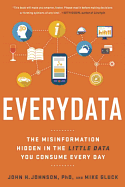
While everyone is talking about “big data,” the truth is that understanding the “little data”—the stats that underlie newspaper headlines, stock reports, weather forecasts, and so on—is what helps you make smarter decisions at work, at home, and in every aspect of your life. The average person consumes approximately 30 gigabytes of data every single day, but has no idea how to interpret it correctly. Everydata explains, through the eyes of an expert economist and statistician, how to decipher the small bytes of data we consume in a day.
Everydata is filled with countless examples of people misconstruing data—with results that range from merely frustrating to catastrophic:
- The space shuttle Challenger exploded in part because the engineers were reviewing a limited sample set.
- Millions of women avoid caffeine during pregnancy because they interpret correlation as causation.
- Attorneys faced a $1 billion jury verdict because of outlier data.
Each chapter highlights one commonly misunderstood data concept, using both realworld and hypothetical examples from a wide range of topics, including business, politics, advertising, law, engineering, retail, parenting, and more. You’ll find the answer to the question—“Now what?”—along with concrete ways you can use this information to immediately start making smarter decisions, today and every day.
Callings: The Purpose and Passion of Work by Dave Isay, Penguin Press
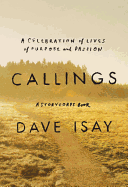 In Callings, StoryCorps founder Dave Isay presents unforgettable stories from people doing what they love. Some found their paths at a very young age, others later in life; some overcame great odds or upturned their lives in order to pursue what matters to them. Many of their stories have never been broadcast or published by StoryCorps until now.
In Callings, StoryCorps founder Dave Isay presents unforgettable stories from people doing what they love. Some found their paths at a very young age, others later in life; some overcame great odds or upturned their lives in order to pursue what matters to them. Many of their stories have never been broadcast or published by StoryCorps until now.
We meet a man from the barrios of Texas whose harrowing experiences in a family of migrant farmers inspired him to become a public defender. We meet a longtime waitress who takes pride in making regulars and newcomers alike feel at home in her Nashville diner. We meet a young man on the South Side of Chicago who became a teacher in order to help at-risk teenagers like the ones who killed his father get on the right track. We meet a woman from Little Rock who volunteers to help former inmates gain the skills and confidence they need to rejoin the workforce. Together they demonstrate how work can be about much more than just making a living, that chasing dreams and finding inspiration in unexpected places can transform a vocation into a calling. Their shared sense of passion, honor, and commitment brings deeper meaning and satisfaction to every aspect of their lives.
An essential contribution to the beloved StoryCorps collection, Callings is an inspiring tribute to rewarding work and the American pursuit of happiness.
Connectography: Mapping the Future of Global Civilization by Parag Khanna, Random House
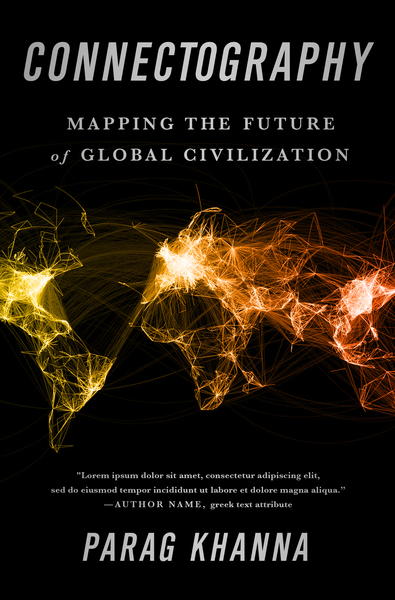 Imagine a map of the world in your mind. Now erase all the borderlines. Now replace those borderlines with new lines connecting regions. Those new lines represent highways, railways, canals, Internet cables and electricity grids—in a word, connectivity. We’re hurtling into a future shaped less by countries than by supply chains—a world in which the most connected powers, and people, will win.
Imagine a map of the world in your mind. Now erase all the borderlines. Now replace those borderlines with new lines connecting regions. Those new lines represent highways, railways, canals, Internet cables and electricity grids—in a word, connectivity. We’re hurtling into a future shaped less by countries than by supply chains—a world in which the most connected powers, and people, will win.
Connectography is a bracing and authoritative guide to what Parag Khanna terms our “global network civilization.” Khanna blasts away today’s conventional wisdom. The world craves China’s infrastructure, not American hegemony. The new arms race of the 21st century is to connect to the most markets—a race China is winning as it has become the top trade partner of twice as many countries as America.
This book is both an intellectual and a boots-on-the-ground journey. Khanna goes from Ukraine to Iran, Mongolia to North Korea, and the Arctic Circle to the South China Sea to show how tug-of-war over pipelines, railways and Internet cables is what conflict looks like today. But Connectography is also a hopeful book, as the increase in connectivity heralds an era of competition but also stability like never before. Khanna argues that new energy discoveries and technologies have eliminated the need for resource wars; ambitious new railways and electricity grids are unscrambling Africa’s fraught colonial borders; even the Arab world is evolving a more peaceful map as it builds resource infrastructures across its war-torn landscape. Beneath the chaos of a world that appears to be falling apart is a new foundation of connectivity pulling it together.
Parag’s book provides a blueprint for winning in this new, post-national age. Places that invest in world-class airports, real estate and schools, and attract the best and brightest—places like New York, Dubai and Singapore—will lead our global network civilization. Areas that remain isolated from global flows of investment and knowledge inevitably decay—unless they transform themselves into thriving nodes along the lines set down in this book.
China's Economy: What Everyone Needs to Know® by Arthur Kroeber, Oxford University Press
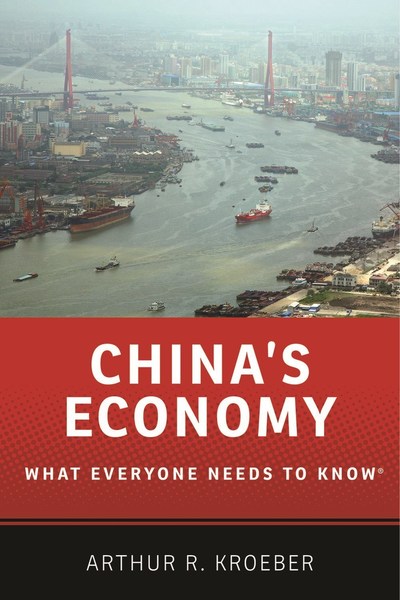 China's Economy: What Everyone Needs to Know® is a concise introduction to the most astonishing economic growth story of the last three decades. In the 1980s China was an impoverished backwater, struggling to escape the political turmoil and economic mismanagement of the Mao era. Today it is the world's second biggest economy, the largest manufacturing and trading nation, the consumer of half the world's steel and coal, the biggest source of international tourists, and one of the most influential investors in developing countries from southeast Asia to Africa to Latin America.
China's Economy: What Everyone Needs to Know® is a concise introduction to the most astonishing economic growth story of the last three decades. In the 1980s China was an impoverished backwater, struggling to escape the political turmoil and economic mismanagement of the Mao era. Today it is the world's second biggest economy, the largest manufacturing and trading nation, the consumer of half the world's steel and coal, the biggest source of international tourists, and one of the most influential investors in developing countries from southeast Asia to Africa to Latin America.
China's growth has lifted 700 million people out of poverty. It has also created a monumental environmental mess, with smog-blanketed cities and carbon emissions that are a leading cause of climate change. Multinational companies make billions of dollars in profits in China each year, but traders around the world shudder at every gyration of the country's unruly stock markets. Most surprising of all, its capitalist economy is governed by an authoritarian Communist Party that shows no sign of loosening its grip.
How did China grow so fast for so long? Can it keep growing and still solve its problems of environmental damage, fast-rising debt and rampant corruption? How long can its vibrant economy co-exist with the repressive one-party state? What do China's changes mean for the rest of the world? China's Economy: What Everyone Needs to Know® answers these questions in straightforward language that you don't need to be an economist to understand, but with a wealth of detail drawn from academic research, interviews with dozens of company executives and policy makers, and a quarter-century of personal experience. Whether you're doing business in China, negotiating with its government officials, or a student trying to navigate the complexities of this fascinating and diverse country, this is the one book that will tell you everything you need to know about how China works, where it came from and where it's going.
Negotiating the Nonnegotiable: How to Resolve Your Most Emotionally Charged Conflicts by Daniel Shapiro, Viking
 From the founder and director of The Harvard International Negotiation Program comes a guide to successfully resolving your most emotionally charged conflicts. In this landmark book, world-renowned negotiation expert Daniel Shapiro presents a groundbreaking, practical method to reconcile your most contentious relationships and untangle your toughest conflicts.
From the founder and director of The Harvard International Negotiation Program comes a guide to successfully resolving your most emotionally charged conflicts. In this landmark book, world-renowned negotiation expert Daniel Shapiro presents a groundbreaking, practical method to reconcile your most contentious relationships and untangle your toughest conflicts.
Before you get into your next conflict, read Negotiating the Nonnegotiable. It is not just “another book on conflict resolution,” but a crucial step-by-step guide to resolve life’s most emotionally challenging conflicts—whether between spouses, a parent and child, a boss and an employee, or rival communities or nations. These conflicts can feel nonnegotiable because they threaten your identity and trigger what Shapiro calls the Tribes Effect, a divisive mind-set that pits you against the other side. Once you fall prey to this mind-set, even a trivial argument with a family member or colleague can mushroom into an emotional uproar. Shapiro offers a powerful way out, drawing on his pioneering research and global fieldwork in consulting for everyone from heads of state to business leaders, embattled marital couples to families in crisis. And he also shares his insights from 1 with three of the world’s toughest negotiators—his three young sons. This is a must read to improve your professional and personal relationships.
Pivot: The Art and Science of Reinventing Your Career and Life by Adam Markel, Atria
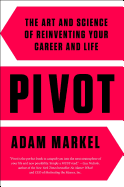
What would you do in your life if you knew you could not fail? That’s the question answered in Pivot, a roadmap for embracing your true potential without abandoning your responsibilities or risking your future. As a transformational teacher and the CEO of Peak Potentials, which has trained more than one million people worldwide, Adam Markel can help you leap out of your comfort zone and into the destiny you’ve always dreamed of.
Whether you are transitioning your career, or have been downsized, or believe that your true potential has yet to be fully tapped, Pivot is a guide to reinvention for anyone, at any age. With clear-eyed compassion and frank assessments, Adam shares the secrets that will guide you away from fear and toward a powerful new vision for your life. The uplifting stories, introspective prompts, clear step-by-step exercises, and energizing calls to action throughout this remarkable book will guide you through the process of personal and career transformation, from creating a vision and clearing space for change to building a supportive environment and establishing daily rituals that will regenerate your soul.
Success and personal fulfillment are within reach! Program your internal GPS to a destination of your wildest imagination—all it takes to change your path is one right turn.
Warren Buffett's Ground Rules: Words of Wisdom from the Partnership Letters of the World's Greatest Investor by Jeremy Miller, HarperBusiness
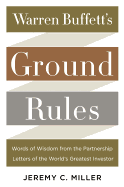 In the fourteen years between his time in New York with value-investing guru Benjamin Graham and his start as chairman of Berkshire Hathaway, Warren Buffett managed Buffett Partnership Limited, his first professional investing partnership. Over the course of that time—a period in which he experienced an unprecedented record of success—Buffett wrote semiannual letters to his small but growing group of partners, sharing his thoughts, approaches, and reflections.
In the fourteen years between his time in New York with value-investing guru Benjamin Graham and his start as chairman of Berkshire Hathaway, Warren Buffett managed Buffett Partnership Limited, his first professional investing partnership. Over the course of that time—a period in which he experienced an unprecedented record of success—Buffett wrote semiannual letters to his small but growing group of partners, sharing his thoughts, approaches, and reflections.
Compiled for the first time and with Buffett’s permission, the letters spotlight his contrarian diversification strategy, his almost religious celebration of compounding interest, his preference for conservative rather than conventional decision making, and his goal and tactics for bettering market results by at least 10% annually. Demonstrating Buffett’s intellectual rigor, they provide a framework to the craft of investing that had not existed before: Buffett built upon the quantitative contributions made by his famous teacher, Benjamin Graham, demonstrating how they could be applied and improved.
Jeremy Miller reveals how these letters offer us a rare look into Buffett’s mind and offer accessible lessons in control and discipline—effective in bull and bear markets alike, and in all types of investing climates—that are the bedrock of his success. Warren Buffet’s Ground Rules paints a portrait of the sage as a young investor during a time when he developed the long-term value-oriented strategy that helped him build the foundation of his wealth—rules for success every investor needs today.



